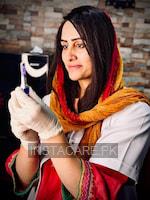Rosacea - Symptoms, Risk factors and Treatment
Last Updated On Thursday, February 19, 2026
Rosacea in Urdu
Rosacea ایک جلد کی حالت ہے جو آپ کو جسمانی اور جذباتی طور پر متاثر کر سکتی ہے۔ تاہم، علاج اور مناسب طرز زندگی میں تبدیلیوں کے ساتھ، اسے اچھی طرح سے کنٹرول کیا جا سکتا ہے. بہت سے لوگوں کو rosacea ہے اور اس کا انتظام کیا جا سکتا ہے۔ اپنے محرکات کو جاننا اور ان سے اجتناب کرنا، اور وقت پر اپنے ماہر امراض جلد سے مشورہ کرنا نہ صرف بیماری بلکہ اس کی پیچیدگیوں، جیسے rhinophyma، کو بھی کنٹرول کرنے میں مدد کر سکتا ہے۔
Rosacea in English
Rosacea is a long-term skin condition that primarily affects the face. The nose, cheeks, and forehead are mostly involved. It may represent bumps and redness on the affected areas.
Signs and symptoms:
The signs and symptoms of rosacea are:
- Redness and flushing of the face
- Dilated blood vessels
- Acne-like bumps
- Sensitive skin
- Change in nose shape or thick nose
Who is at risk of getting rosacea?
Rosacea can affect anyone, but middle-aged females are at risk. Moreover, fair-skinned people are at risk. Family history may play a role in getting rosacea too.
Rosacea does not spread from one person to another, which means it is not contagious. So neither you can catch it from someone by close contact, nor can transmit it to anyone. Also, it is not caused due to poor hygiene
What causes rosacea?
The exact cause of rosacea is unknown. However, research is being conducted to help get a better insight into the exact underlying mechanism of this disease. It has been found that auto-inflammation plays a role in causing rosacea. Inflammation is a process by which your body helps fight off germs and protects you from diseases. In auto-inflammation, your body’s inflammatory response is hyperactivated, and it may damage its tissues. However, there is still a lot yet to be known for the exact cause of rosacea.
What exacerbates rosacea?
Rosacea can be exacerbated by literally anything resulting in worsening of the condition known as rosacea flare-ups. It is highly recommended to know your triggers yourself and keep a journal for it. Different things trigger different people differently. Some of the things that cause rosacea flare-ups are:
- Sunlight
- Emotional stress
- Spicy foods
- Alcohol
- Caffeine
- Cosmetics
- Cold or wind
- Hot temperatures
- Exercise
Cure for rosacea?
Unfortunately, there is no cure for rosacea. However, it can be managed by different treatment strategies.
Treatment for rosacea:
Your dermatologist might prescribe you topical ointments to help reduce redness and inflammation or oral medications. Both may be used at the same time too.
For topical application, your dermatologist might suggest metronidazole, azelaic acid, or brimonidine.
For oral medications, antibiotics like metronidazole, doxycycline, minocycline, or ivermectin may be given. Moreover, your dermatologist may give isotretinoin which is similar to vitamin A, which is also used for treating stubborn acne.
Your dermatologist may also suggest laser therapy if your rosacea is severe.
Management for rosacea:
Rosacea can be managed by avoiding exacerbating factors and making little changes in your life like:
- Wearing sunscreen when going out in the sun
- Avoiding spicy foods
- Avoiding alcohol
- Avoiding caffeine
- Avoiding emotional stress
- Avoiding harsh face wash products
- Avoiding makeup that irritates your skin
- Avoiding intense exercises
Knowing what triggers your rosacea helps avoid flare-ups as you will know better what to avoid.
Ocular rosacea:
Sometimes, rosacea may affect your eyes, making them feel dry, irritable, and sensitive to the light-a condition known as ocular rosacea. If you get eye symptoms along with rosacea, it is recommended to consult your doctor. They might suggest eye drops to help manage that.
Complications of rosacea:
Over time, if rosacea is left unmanaged and untreated, it may result in the deposition of tissues around your cheeks and nose, a condition known as rhinophyma. It is due to the enlargement of the sebaceous glands in that area and affects men more than women.
Conclusion:
Rosacea is a skin condition that may affect you physically and emotionally. However, with treatment and adequate lifestyle changes, it can be controlled well. Many people have rosacea and it can be managed. Knowing your triggers and avoiding them, and consulting your dermatologist on time can help control not only the disease but its complications, like rhinophyma, too.









